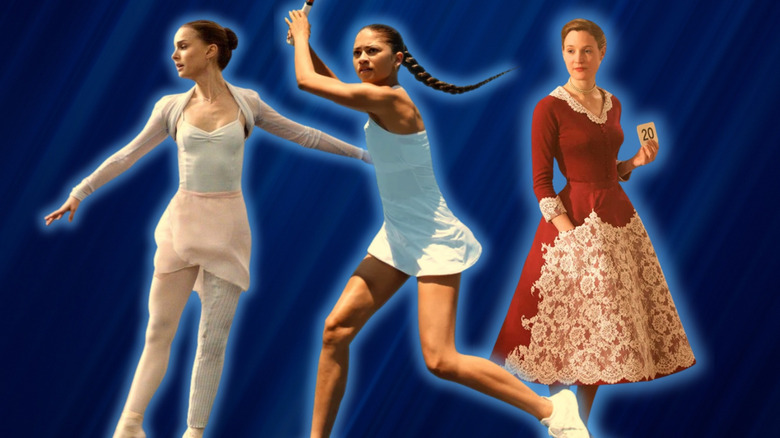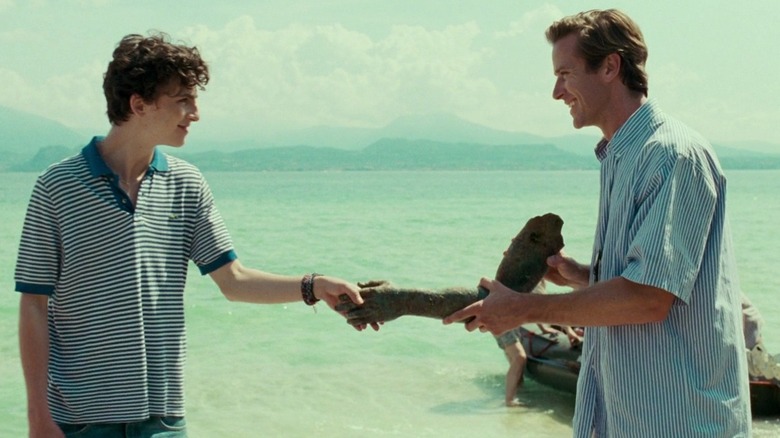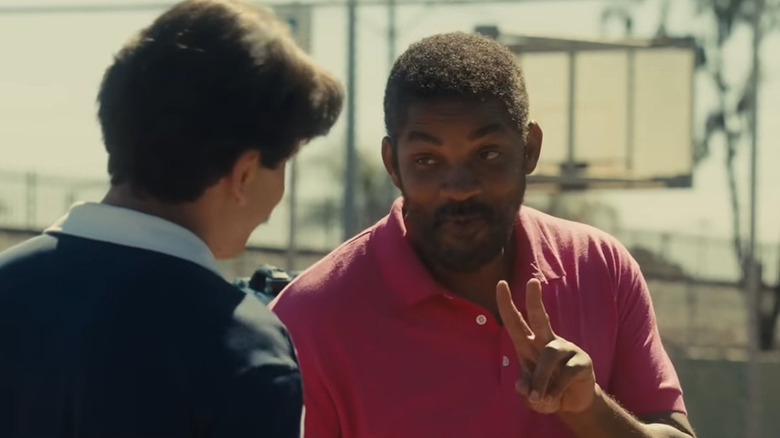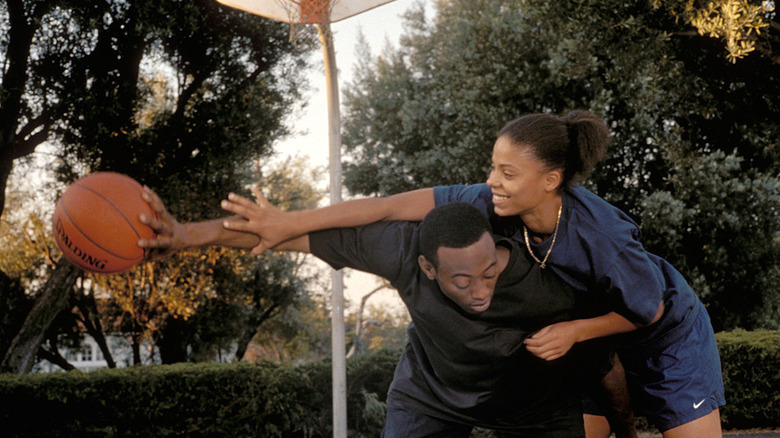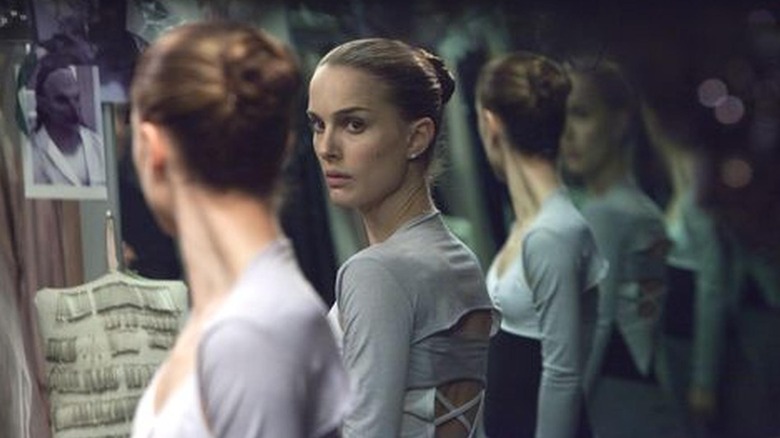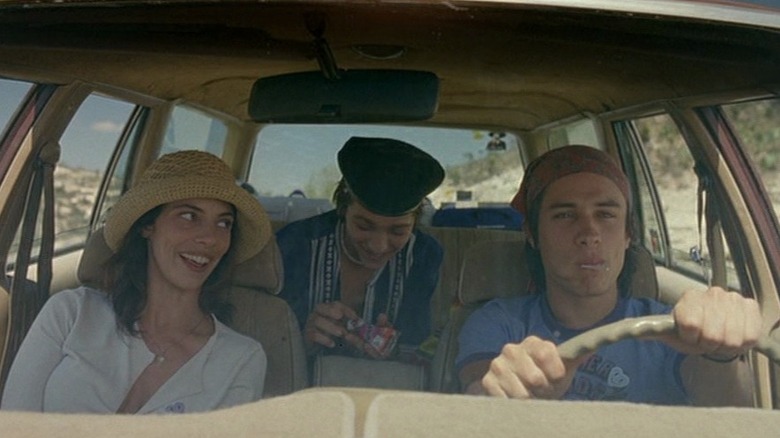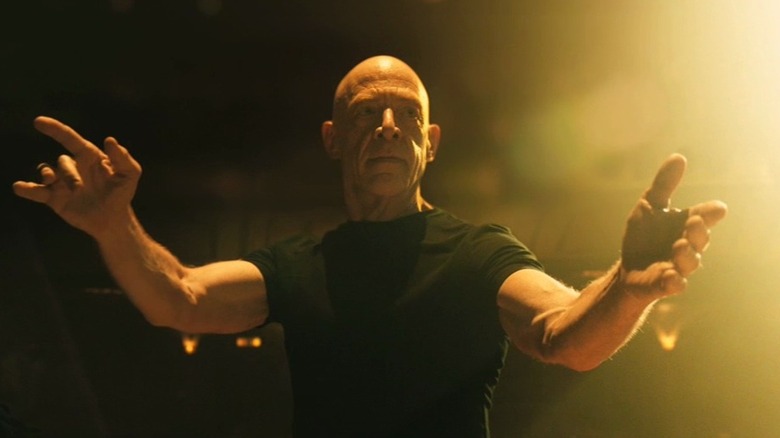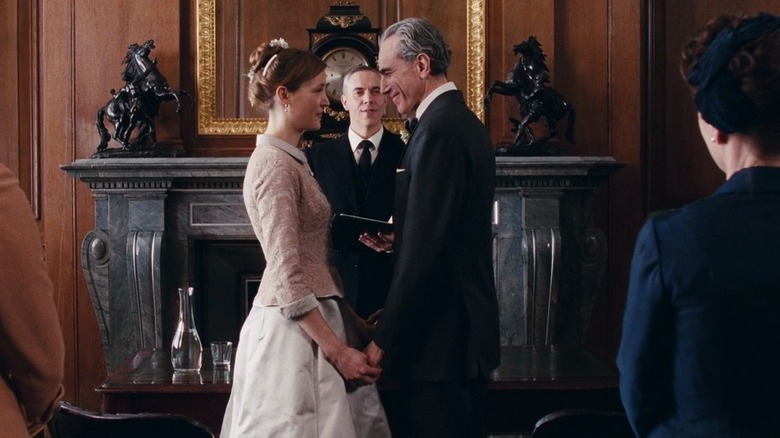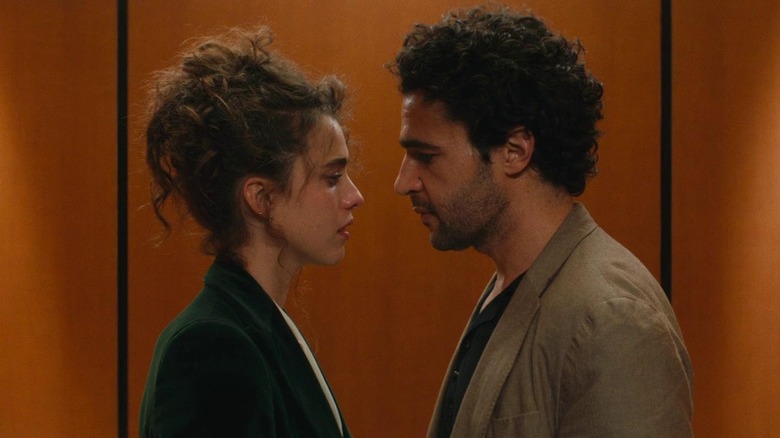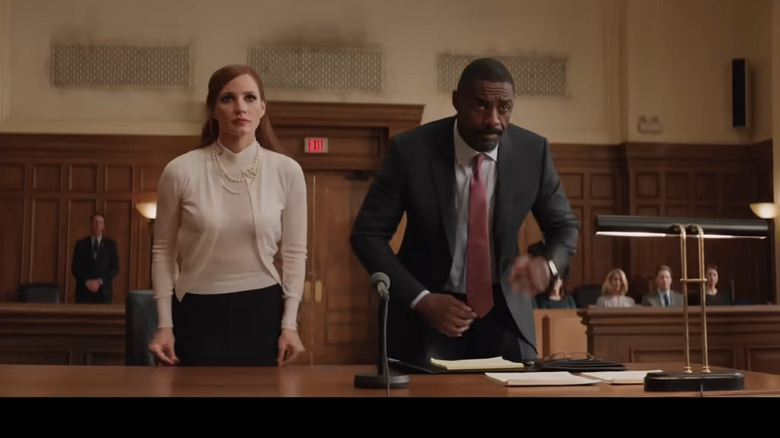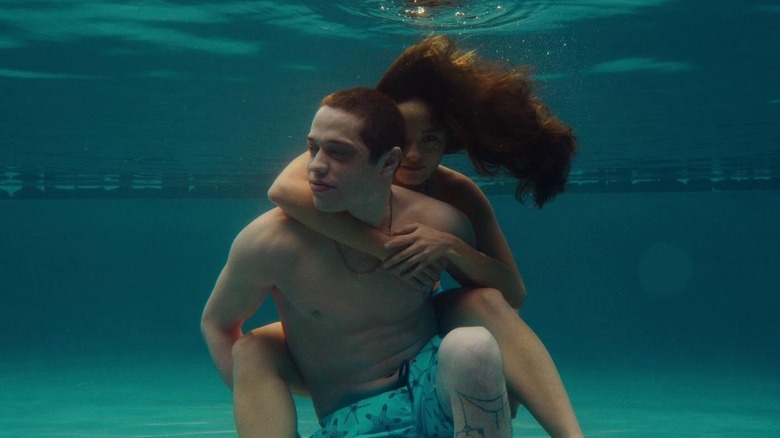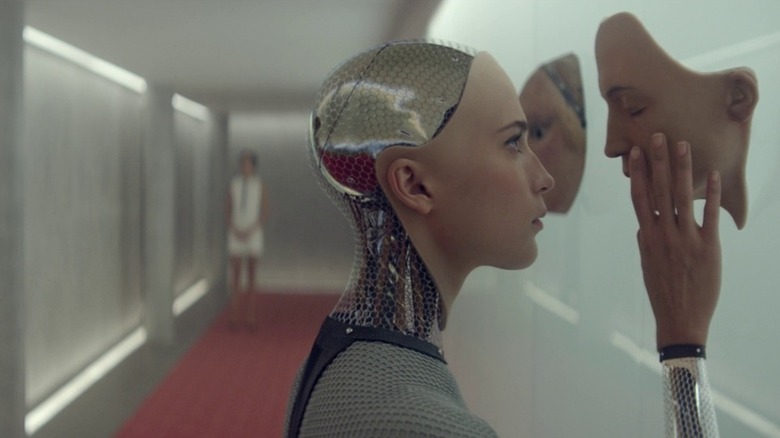12 Best Movies Like Challengers
"Challengers" is not a film that feels like its been done before. Certainly there have been many sports-related films over the past 100 or so years, plus quite a few films focusing on the unhealthy relationship dynamics of a dramatic love triangle. There are films about friendship, films that cut across time, films that give their audience ambiguous endings, films with subversive scores, and movies that star serious up-and-comers. There aren't really any films besides "Challengers" that do all of these things, though, certainly none that benefit from the insightful, passionate direction of Luca Guadagnino.
One thing that remains true of "Challengers" for its entire run is that it is never a comfortable watch. There's a lot that goes unsaid between the main characters of "Challengers" and a lot of emotional wounds they exact upon each other. Instead of depicting tennis as a bastion of fairness and order to offset these interpersonal struggles — as many sports movies do — Guadagnino has his characters express their basest urges through their sport. For Tashi (Zendaya), Art (Mike Faist), and Patrick (Josh O'Connor), tennis is free expression, a chance to embrace the ambiguity of their existence. There are many movies on this list that explore emotional outlets for volatile characters, as well as films that show the pitfalls of talent and ambition. These are sports movies, romances, thrillers, and everything in between, and they all have in common complex characters and interpersonal dynamics.
Call Me By Your Name
Luca Guadagnino made a name for himself thanks to the ecstatic, widespread critical reception of his 2017 film "Call Me By Your Name." The film follows a young man named Elio (Timothée Chalamet) who enters into a passionate relationship with his father's graduate student one summer. The graduate student, Oliver (Armie Hammer), stays with Elio's family for the season and soon unlocks a whole new world of love and passion for Elio, and though their romance is ephemeral ("Call Me By Your Name" has a particularly erotic scene involving a peach), it remains a formative time in Elio's life.
As long as viewers can compartmentalize their feelings over 2021 allegations that co-lead Armie Hammer has a cannibalism fetish, "Call Me By Your Name" is a fantastic film to watch. Guadagnino approaches all of his characters with a tender hand. His stories are about the ambiguous, unsaid things between people and characters that crave intimacy more than identity. Art loves Tashi beyond reason, desires her beyond reason, and he sacrifices the most meaningful friendship in his life to pursue her. Tashi loves tennis beyond reason and can't stay with Patrick after sustaining her injury because being with him feels too much like playing real tennis. Neither character is fulfilled by the end of "Challengers," but "Call Me By Your Name" grants the same eroticism with a much more poignant sense of closure.
King Richard
Films like "Battle of the Sexes" and "Wimbledon" center around tennis and its culture. Any decent tennis film should include clay courts and stiff pleats bleached glowing white, not to mention impressive, athletic stunts. "Challengers" combines these aesthetic staples with a modern, electronic score and sleek lighting, as well as a star — Zendaya Coleman — whose real-world style is so actualized that it feels like one of the strengths she brings to the role of Tashi. "King Richard" doesn't exactly have the impressive flavor of "Challengers," but it is definitely the most similar tennis film to "Challengers" that has been made so far.
"Challengers" isn't based on a real story at all, so there's a lot more freedom for the narrative to present its characters as particularly unlikable. By contrast, "King Richard" is actually about Richard Williams (Will Smith), father and coach of Venus (Saniyya Sidney) and Serena Williams (Demi Singleton), also known as two of the greatest tennis players of all time. Where Tashi pushed herself and then Art to succeed professionally in "Challengers," Richard spends a lot of "King Richard" attempting to balance a desire for his daughters' success and a desire to preserve their childhoods. There are plenty of things "King Richard" doesn't tell audiences about the real story, but it's a compelling film nonetheless.
Love and Basketball
There's probably no other film on this list that better aligns with the plot and relationship dynamics of "Challengers" than "Love & Basketball." "Love & Basketball" follows childhood friends and neighbors Monica (Sanaa Lathan) and Quincy (Omar Epps) as they grow up, get through high school and college, and struggle to turn their (mutual) love of basketball into a thriving career. "Love & Basketball" is easily one of the best basketball movies of all time, but it's also one of the best romance movies out there. Lathan and Epps share an inherent physical chemistry that neither O'Connor nor Faist can generate with Zendaya in "Challengers" despite the acting prowess of all three.
"Love & Basketball" also takes a closer look at what it means to be prodigiously talented. Like Tashi, Quincy and Monica define themselves by their talent in and passion for their sport. Tashi's life-altering injury is a small part of "Challengers," but likely the most devastating thing that Tashi goes through as an individual. Both films casually pose the question: Are we setting young people up for success when we encourage them to make their entire life about a sport? The answer is almost certainly no — Tashi herself admits that she never seriously pursued a future in anything other than tennis, and a similar experience with injury sharply alters the course of Quincy's life in "Love & Basketball."
Black Swan
There are worse things than injury that can happen to someone when they obsess over one specific part of their life. Sure, it stinks to get injured in a way that totally derails your future career as a professional athlete, but at least Tashi retained her sanity. In "Black Swan," New York City Ballet dancer Nina (Natalie Portman) reaches the apex of her craft when she is cast as both the White and Black Swan in Tchaikovsky's "Swan Lake." Almost immediately following her casting (which she wasn't expecting because of an inconsistent audition), Nina becomes so overwhelmed by the pressure of her role that her mental state begins to deteriorate.
"Swan Lane" is far more horrifying and tense than "Challengers." A toxic love triangle is definitely not something that any well-adjusted person wants to have to navigate, but "Challengers" never gives the impression that any of its characters are in serious physical or mental danger. Fans don't universally classify "Black Swan" as a horror film, but there is true evil depicted in the movie. "Black Swan" takes a clear stance: The pressures and physical realities that come with a career in ballet are evil and will ultimately lead to rot and self-destruction. "Challengers," by contrast, is more of a film about how all human beings are made up of complex contradictions.
Y Tu Mamá También
"Challengers" is not the first film to depict a very close male friendship as it is tested by the presence of a mutually desired woman. Where this model has been most successfully executed is in Alfonso Cuarón's "Y Tu Mamá También," and a case could easily be made that "Challengers" would not exist were it not for the quiet revolution that came with Cuarón's sensual, liberating film about the volatile nature of intimacy. "Y Tu Mamá También" is a roadtrip film that centers on a dispute between two young, male best friends over a woman they both like. Like Tashi does for Art and Patrick, Luisa (Maribel Verdú) encourages Julio (Gael García Bernal) and Tenoch (Diego Luna) to set aside their performative masculinity and explore their own connection.
Like Tashi, Luisa is a fascinating character who is left nearly unexplored in her film. "Y Tu Mamá También" is, after all, about Tenoch and Julío and their doomed friendship. The class disparity between Tenoch and Julío was always going to end their connection. Tenoch and Julío only meet Luisa thanks to Tenoch's family connections, and Luisa, 10 years their senior, is troubled by serious things. The audience is only allowed to know about them; Luisa gives very little of her own story in "Y Tu Mamá También." Tashi suffers her tennis injury like the loss of a limb,and yet viewers receive very little of her story as well. In both cases, it feels like they're being allowed a modicum of privacy, as if that is their reward for serving as such idealized and projected upon characters in the lives of two men.
Whiplash
"Whiplash" may not be a sports movie, but it's only one of a fair few out there that can match the unwavering pace of "Challengers." Instead of focusing on athletics, it revolves around jazz musicians and the extreme level of competition that performers need to deal with when they pursue a career in fine arts. Actor Miles Teller underwent hours and hours of intense training to be able to star in "Whiplash" as Andrew — a young, gifted jazz drummer who wants nothing more than to perform professionally. The film centers on Andrew's stormy relationship with his abusive band director, Terence Fletcher (J.K. Simmons), and while there is no abuse depicted in "Challengers," there are many toxic moments between characters.
If Andrew ever met Tashi, he'd most likely find in her a kindred spirit. Andrew's love for drumming is single-minded and obsessive, and while Tashi definitely handles the whole work/life balance thing better than him, she has the same obsession with tennis. Both of them felt like they found their calling, but Tashi is forced to stop playing tennis after an injury causes her to lose her gift. While most people would probably be horrified by the ending of "Whiplash" and Andrew's decision to continue enduring abuse and pain for his art, Tashi would probably understand and admire his willingness to give everything for his passion.
Phantom Thread
While "Challengers" wasn't a good enough movie to convince Daniel Day Lewis to return to acting, it does explore many of the same themes as his supposed last film ever, "Phantom Thread." (He's already walked it back, with a lead appearance in the upcoming "Anemone.") Codependency, for example, is thoroughly explored in both films. In "Challengers," Art is only comfortable when he's worshipping someone else, whether that's Patrick or Tashi. Tashi needs Art so she can live out her tennis career through his. Patrick clearly thrives as a tennis player when Art is playing alongside him. Things are messy between the three, and watching them makes for compelling cinema, but there are other films that provide even wilder intimacies.
"Phantom Thread" is set in the 1950s and follows a young woman named Alma (Vicky Krieps) as she is swept off her feet by a successful fashion designer named Reynolds Woodcock (Daniel Day Lewis). The honeymoon phase between them eventually wears off, and Reynolds' obsessiveness, megalomania, and self-repression drive a quick wedge between them. Alma is eventually driven to poison Reynolds with wild mushrooms, desperate to take control away from him. It just gets more twisted from there, and ultimately they find a way to be together despite their toxic codependency.
Sanctuary
In "Sanctuary," Hal (Christopher Abbott) and Rebecca (Margaret Qualley) regularly and safely sate their urges through ongoing scenes of BDSM. Most of the film's screen time is dedicated to depicting one intense night in their ongoing BDSM relationship. It's a very different film from "Challengers" in many ways, but one thing about it that rings similar is the complex dynamic between its main characters. The relationship between Tashi, Art, and Patrick is unconventional from the very beginning because both boys — who are very close with each other — choose to pursue Tashi when they meet her. This creates an entanglement that the three are never able to shake off.
Rebecca and Hal become involved through very different circumstances — Hal pays Rebecca to play out BDSM scenes with him. Their connection should be mainly transactional, but it is clear almost from the start that both Rebecca and Hal are invigorated by their scenes, and when Hal explains that he will be taking over a high-profile CEO job from his father, Rebecca claims that she is the reason he's become confident enough to earn the position. They're both young and attractive, and this is definitely a sex-forward film with a close read on two characters that seem just as flummoxed by themselves and each other as the audience is.
Molly's Game
Jessica Chastain shines in "Molly's Game," a film about a talented young skier who sustains a serious injury that cuts her athletic career tragically short. The movie doesn't share everything there is to know about the story behind "Molly's Game" – for example, audiences don't get to see Tobey Maguire playing himself (aka Player X). But the movie isn't really about the celebrity players of Molly Bloom's underground poker games; it's about Molly herself. Molly Bloom was close to qualifying for the Olympics as a skier despite recovering from a serious back injury, but a big fall during a ski run forced her out of the sport for good in 1998.
Molly was an intense athlete in love with her sport who was forced to quit due to an injury, which sounds pretty familiar to fans of "Challengers." While Tashi was still able to work as a training partner and coach in tennis, Molly was unable to continue operating in the world of professional skiing, and instead pursued another kind of extreme thrill by facilitating underground poker games for celebrities and high rollers. If Tashi hadn't been able to project her dreams and goals onto Art's career, she might very well have ended up in a situation similar to Molly's — seeking thrills and ignoring risks.
Bodies Bodies Bodies
"Bodies, Bodies, Bodies" is a horror movie, but definitely one that breaks conventions of the genre. The film follows a young woman named Sophie (Amandla Stenberg) who is bringing her new girlfriend Bee (Maria Bakalova) to a getaway with old friends from high school. Sophie is sober, but her friends are not, and the toxic dynamics between friends become clear almost immediately upon Sophie and Bee's arrival. At one point in the movie, Sophie admonishes her friends for being "triggering as f***," because all of their relationships are overrun with toxic history and ongoing cycles of harmful behavior that seem impossible to resolve.
While filming in a mansion surrounded by forest for miles, the cast of "Bodies, Bodies, Bodies" was beset by a real-life hurricane, which aligned with the film's plot that saw a group of friends driven mad with suspicion and fear during a power blackout caused by a hurricane. In the same way that the sexual dynamics between Tashi, Art, and Patrick never feel resolved or addressed, so do the many sexual and emotional dynamics between friends in this film. "Bodies Bodies Bodies" also manages to clinch an ending nearly as chaotic as that of "Challengers," leaving viewers with many questions and almost no answers.
Ex Machina
When a viewer watches "Challengers" with a distinctly feminist lens, it's not difficult to see how Tashi is objectified by Art and Patrick. They aren't cat-calling her on the street or anything, but both men view Tashi as inhumanly attractive thanks to her talent and sexual appeal. While Art purports to love Tashi, he idealizes her to a point where she can do no wrong in his eyes. He gives her far more power over him than she ever wanted. Patrick knows that Tashi is human, but he also doesn't respect her as an athletic peer, and once she takes up with Art, Patrick's obsession with getting her back feels a lot more about his erstwhile friendship with Art than his desire for Tashi.
"Challengers" gives viewers a volatile love triangle, and "Ex Machina" does the same thing, albeit with very different stakes. Ava (Alicia Vikander) is an artificial intelligence whose android body is being built by a genius billionaire named Nathan (Oscar Isaac). Nathan views Ava and his other android women as objects meant to fulfill his needs and assuage his massive ego, but he brings a low-level programmer named Caleb (Domhnall Gleeson) to his compound to interact with Ava in order to see how she communicates with another person. Caleb projects his desire to be a hero onto Ava, and while it feels more benevolent than Nathan's objectification of her, Caleb's feelings are still centered on himself and what Ava can do for him.
Saltburn
There isn't as much about "Saltburn" that aligns with "Challengers" as there is for most of the other films on this list, but both films occupy the same genre active in contemporary cinema right now: They focus on constant destabilization. They look and feel like lush dramas with rich visuals and evocative soundtracks, but they operate like thrillers — never allowing the audience to get comfortable with the narrative. The main character of "Saltburn," Oliver (Barry Keoghan), isn't opaque — his sexual proclivities are definitely explored throughout the film — but his ultimate goal is still not clear until the end of the film.
Tashi is similar to Oliver in that she drives a lot of the plot of "Challengers" despite the fact that the audience doesn't really know what's going on in her head the way they do Art and Patrick. This is partially just because Tashi is guarded and Art and Patrick are easier to read than the works of Dr. Seuss, but also because it's never supposed to be entirely clear what Tashi wants. "Saltburn" actually resolves Oliver's arc more definitively than "Challengers" does for Tashi, but it does seem like all she wanted, in the end, was to watch some really great tennis.
